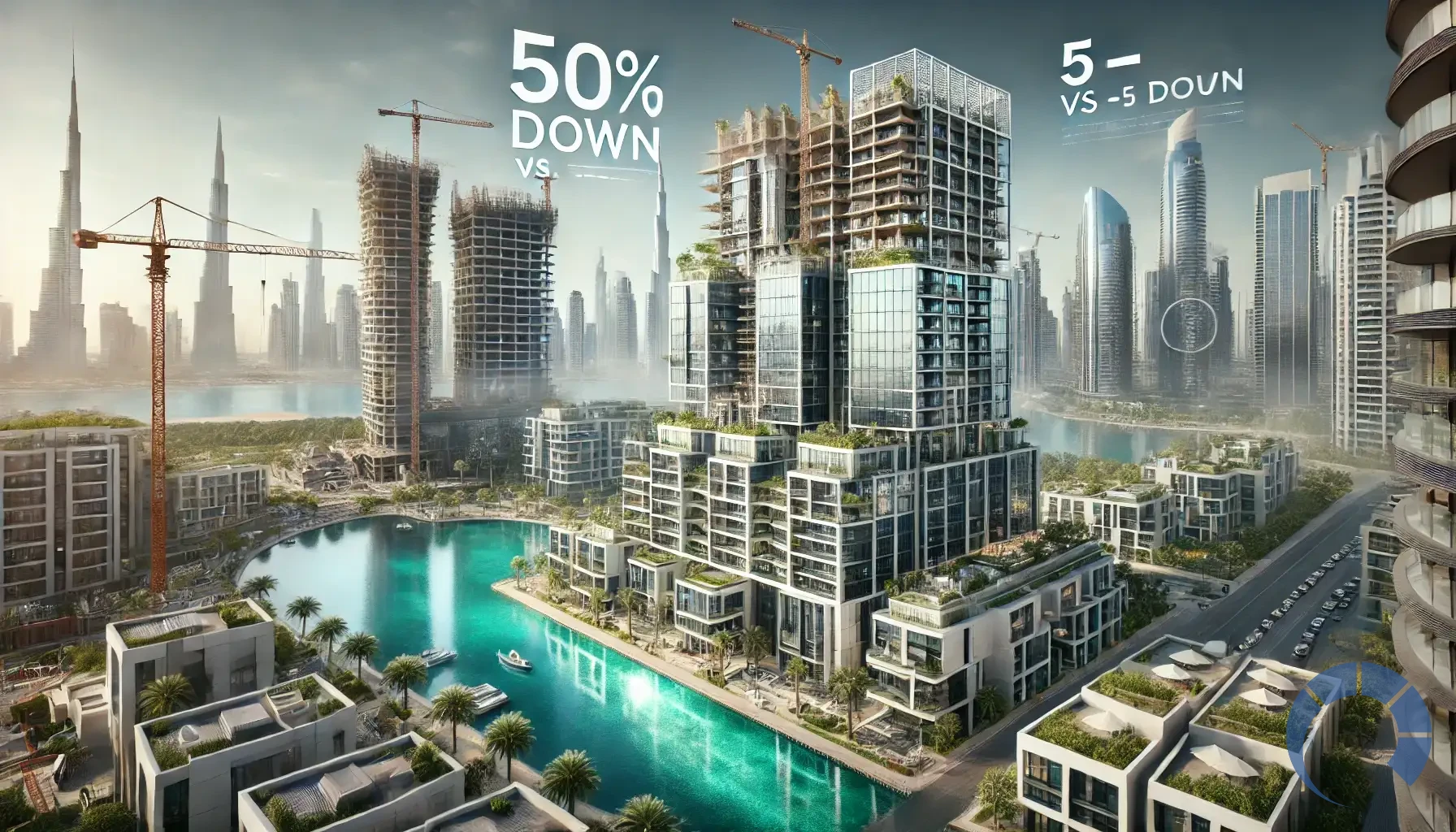
What Are the Main Differences Between Off‑Plan Mortgages and Post‑Handover Payment Plans in Dubai?
Dubai’s real estate market is renowned for its innovation, luxury, and dynamic growth. One of the most appealing segments for investors and homebuyers alike is the off‑plan property market. Financing these properties, however, can be approached in two distinct ways: via an off‑plan mortgage or through a developer‑offered post‑handover payment plan. Although both options are designed to make property acquisition more accessible, they differ significantly in structure, cost, risk, and flexibility. This article will explore these key differences, discuss the advantages of choosing a post‑handover payment plan over an off‑plan mortgage, and outline the legal protections available to buyers.
1. An Overview of Off‑Plan Mortgages in Dubai
Off‑plan mortgages are financing solutions provided by banks to help buyers acquire properties that are still under construction. These mortgages share similarities with traditional home loans but come with added requirements that reflect the increased risks associated with an uncompleted asset.
Key Characteristics of Off‑Plan Mortgages
- Higher Down Payment Requirement:
Typically, banks require a down payment of around 50% of the property’s value when financing off‑plan properties. This high down payment requirement is designed to mitigate the risk associated with projects that have not yet been delivered. - Interest Charges and Additional Fees:
In addition to the principal and interest, borrowers are expected to cover costs such as the Dubai Land Department (DLD) mortgage fee (approximately 0.25%), application fees (around 1%), and property insurance (about 0.5%). These add to the overall cost of financing. - Flexible Repayment Terms:
Most off‑plan mortgages in Dubai come with repayment terms of up to 25 years, allowing buyers to spread the cost over a longer period. Monthly installments typically include both principal and interest. - Stringent Approval Process:
Since off‑plan financing involves a property that is not yet built, banks rigorously scrutinize the project details, the developer’s reputation (usually favoring established names such as Emaar, Nakheel, Dubai Properties, or Meraas), and the borrower’s financial background. Eligibility criteria such as age limits (21–65 for expatriates and up to 70 for UAE nationals and self‑employed applicants), minimum salary requirements (usually around AED 15,000 for expats), and a strong credit record must be met. - Customization Options:
Buyers often have the option to choose between fixed‑rate and variable‑rate mortgages, as well as specialized products such as Emirates NBD’s “Future‑Value” mortgage that is tailored specifically for off‑plan properties.
For more detailed insights into financing strategies, check out our article on Dubai Real Estate Investment Trends 2025: Strategies for Maximizing ROI.
2. An Overview of Post‑Handover Payment Plans
In contrast to off‑plan mortgages, post‑handover payment plans are directly offered by property developers. These plans allow buyers to complete the remaining balance of their property purchase after the building has been delivered (handover). They come with a different cost structure and set of benefits that appeal to a broad range of buyers.
Key Characteristics of Post‑Handover Payment Plans
- Lower Upfront Costs:
One of the most attractive features of post‑handover payment plans is the significantly lower down payment requirement. Typically, buyers only need to pay between 5% to 10% upfront, compared to the much higher down payment required for off‑plan mortgages. - No Interest or Additional Financing Fees:
Because these plans are structured as direct payment schedules between the buyer and the developer—rather than through bank financing—they do not incur interest charges or additional fees (such as the DLD mortgage fee, application fees, and property insurance). This can reduce the overall cost of the property. - Shorter Repayment Periods:
Developers’ post‑handover plans often feature shorter repayment periods, typically between 2 to 5 years, and in some cases even up to 10 years. This allows buyers to complete their payments more quickly than with a 25‑year mortgage. - Fixed Payment Schedules:
Payment plans are set by the developer and generally follow a predetermined schedule that may be linked to milestones (such as handover) or time intervals. Unlike mortgages, which may allow for refinancing or rate adjustments, these plans are fixed and less flexible once agreed upon. - Accessibility:
Post‑handover payment plans do not involve third‑party banks. As a result, they have fewer eligibility requirements; there are no age restrictions or credit checks typically imposed by lenders, which can make them more accessible to a wider range of buyers.
Developers often use these plans to boost sales by providing potential buyers with a straightforward and attractive financing option. For more insights into off‑plan investments, consider reading our post on Exploring the Benefits of Off‑Plan Property Investments in Dubai (internal link used as an example).
3. Key Differences Between Off‑Plan Mortgages and Post‑Handover Payment Plans
When deciding how to finance your property purchase in Dubai, it is crucial to understand the main differences between off‑plan mortgages and post‑handover payment plans. Below is a detailed comparison:
Upfront Costs
- Off‑Plan Mortgages:
Require a down payment of approximately 50% of the property’s value. This substantial upfront investment is necessary to secure bank financing and reduce the lender’s risk. - Post‑Handover Payment Plans:
Typically require only a 5–10% down payment. This lower initial cost makes these plans more accessible, particularly for first‑time buyers or those with limited liquidity.
Interest and Fees
- Off‑Plan Mortgages:
Incur interest charges over the repayment period and additional fees such as:- DLD mortgage fee (around 0.25%)
- Application fees (about 1%)
- Property insurance (approximately 0.5%)
- Post‑Handover Payment Plans:
Do not involve bank financing; therefore, there are no interest charges and fewer additional fees. Some developers even offer waived fees (for example, a portion of the DLD fee) to incentivize buyers.
Repayment Period
- Off‑Plan Mortgages:
Offer long repayment terms of up to 25 years, enabling buyers to manage monthly payments over a long period. This extended term can make larger loans more affordable on a month‑to‑month basis. - Post‑Handover Payment Plans:
Generally have shorter repayment periods ranging from 2 to 5 years after handover. In some cases, developers offer plans that extend up to 10 years. The shorter term results in a quicker path to full ownership but requires more concentrated cash flow over a shorter period.
Flexibility and Customization
- Off‑Plan Mortgages:
Allow buyers to choose between different loan types (fixed‑rate or variable‑rate) and even provide opportunities for refinancing later on. This flexibility can help adjust to changing market conditions or personal financial circumstances. - Post‑Handover Payment Plans:
Typically lock buyers into the developer’s set payment schedule. These plans are less flexible, as they are predetermined and may not offer options for refinancing or adjustments if financial circumstances change.
Eligibility and Approval Process
- Off‑Plan Mortgages:
Have stringent eligibility criteria including age limits (21–65 for expats, up to 70 for nationals/self‑employed), minimum salary requirements (e.g., AED 15,000 for expats), and detailed documentation (passport, residency, bank statements, etc.). Banks also perform rigorous credit checks and project evaluations. - Post‑Handover Payment Plans:
Are typically offered directly by developers and do not involve the bank’s approval process. They generally have no strict eligibility criteria, making them more accessible, especially to buyers who might not qualify for a bank‑financed mortgage.
Risk Exposure
- Off‑Plan Mortgages:
Banks mitigate risk by only lending up to 50% of the property’s value. This provides a level of financial security to both the lender and the buyer. However, if the market fluctuates or if construction is delayed, buyers might face financial challenges related to mortgage repayments. - Post‑Handover Payment Plans:
Do not involve bank financing, which means there is no interest risk or additional fees from a financial institution. However, buyers assume the full market risk associated with the developer’s performance and project delivery. If a developer encounters delays or financial difficulties, buyers could face challenges with their payment schedule.
For additional insights on financing and property investment strategies in Dubai, check out our blog post Dubai Real Estate Investment Trends 2025: Strategies for Maximizing ROI.
4. Advantages of Choosing a Post‑Handover Payment Plan
While off‑plan mortgages offer the benefits of flexible loan options and longer repayment periods, post‑handover payment plans provide several distinct advantages that may be more attractive to certain buyers:
Lower Upfront Costs
- Accessibility:
With only a 5–10% down payment required, post‑handover plans lower the barrier to entry for many buyers. This is especially beneficial for first‑time buyers or those who prefer to retain a larger portion of their capital for other investments.
No Interest or Extra Fees
- Cost Savings:
Because there is no bank financing involved, buyers avoid interest payments and other additional fees (such as mortgage application fees, DLD fees, and property insurance costs). This can result in substantial savings over the life of the payment plan.
Shorter and Predictable Payment Schedule
- Simpler Cash Flow Management:
With a fixed payment schedule that typically spans 2 to 5 years (and sometimes up to 10 years), buyers can plan their finances with greater certainty. The absence of fluctuating interest rates means that monthly installments remain constant.
Direct Buyer–Developer Relationship
- Streamlined Process:
Post‑handover plans are arranged directly between the buyer and the developer, eliminating the need for third‑party bank involvement. This can result in a faster, more straightforward process with fewer approval hurdles.
Potential Incentives from Developers
- Waived Fees and Attractive Terms:
Developers may offer incentives such as waiving a portion of the DLD fee or providing flexible payment terms to attract buyers. Additionally, some plans may include extended payment periods or lower monthly installments to make the purchase more attractive.
More Accessible to a Broader Range of Buyers
- No Strict Credit or Age Requirements:
Because post‑handover plans do not require a bank’s involvement, buyers are not subjected to strict credit checks or age restrictions. This makes them accessible to a wider audience, including those who might not qualify for traditional financing.
These advantages make post‑handover payment plans particularly appealing for buyers looking for lower financial entry points and greater predictability in their payment obligations.
5. Legal Protections for Buyers Using Post‑Handover Payment Plans
While post‑handover payment plans offer many benefits, buyers should also be aware of the legal protections in place to safeguard their interests:
Regulatory Oversight by the Dubai Land Department (DLD)
- Government Regulation:
The DLD closely regulates all real estate transactions in Dubai, including post‑handover payment plans. This regulatory framework ensures that developers adhere to strict guidelines and that the rights of buyers are protected.
Escrow Accounts
- Financial Security:
In many off‑plan transactions, payments are held in escrow accounts. Although post‑handover plans involve payment after the handover of the property, any installments paid in advance by the buyer are typically secured through escrow arrangements. This ensures that funds are safeguarded and are only released according to the contract’s terms.
UAE Civil Code Protections
The UAE Civil Code offers several legal safeguards for property buyers:
- Article 295:
Buyers may claim compensation for financial losses resulting from delays in construction or delivery. - Article 569:
This provision requires developers to deliver the property exactly as specified in the Sales and Purchase Agreement (SPA). - Article 572:
Buyers have the right to either wait for the correct unit or cancel the contract if the delivered property does not meet the agreed specifications. - Article 574:
If the terms in the SPA are found to be unfair or excessively one-sided, buyers can challenge these provisions through the courts.
Contractual Obligations and Developer Accountability
- Sales and Purchase Agreement (SPA):
The SPA is a binding contract between the buyer and the developer. It outlines all payment terms, milestones, delivery dates, and penalties for non-compliance. Buyers are advised to thoroughly review the SPA (and seek legal advice if necessary) to understand their rights and obligations fully. - Resale Conditions:
In many cases, developers include specific resale conditions in the SPA. For example, a developer might require full or partial settlement of outstanding dues before issuing a Resale No Objection Certificate (NOC), ensuring that buyers remain committed to the agreed payment schedule.
These legal protections are designed to minimize risk and provide buyers with recourse if the property is not delivered as promised. However, due diligence is critical, and buyers should consider engaging legal counsel to review all contractual documents before finalizing their purchase.
For additional legal guidance on property transactions in Dubai, you may refer to our article What Are the Regulations and Laws Regarding Foreign Ownership of Property in Dubai?.

6. A Comparative Summary
Let’s briefly summarize the main differences between off‑plan mortgages and post‑handover payment plans in Dubai:
Feature | Off‑Plan Mortgages | Post‑Handover Payment Plans |
|---|---|---|
Down Payment | Typically 50% of the property value | Typically 5–10% of the property value |
Interest & Fees | Incur interest charges and additional fees (e.g., DLD fee, application fee, property insurance) | No interest charges; minimal or no additional financing fees |
Repayment Period | Up to 25 years, with monthly payments including principal and interest | Generally shorter, ranging from 2–5 years (sometimes up to 10 years) |
Flexibility | Offers customizable options (fixed or variable rates, refinancing) | Fixed payment schedule set by the developer; less flexible |
Eligibility | Strict criteria (credit history, age, minimum salary, documentation) | Fewer eligibility requirements; no age limits or credit checks |
Risk Exposure | Banks mitigate risk by financing only 50% of property value, but market fluctuations and delays can impact repayments | Buyer assumes full market risk; no bank involvement minimizes interest risk |
Legal Protections | Regulated by banks and DLD, with escrow accounts and contractual safeguards | Direct regulatory oversight by DLD, with additional civil code protections and escrow arrangements |
While off‑plan mortgages provide financial flexibility and longer repayment terms, they come with higher upfront requirements, interest costs, and a stricter approval process. On the other hand, post‑handover payment plans, with their lower down payments and absence of interest charges, offer an accessible, straightforward alternative—albeit with less flexibility once the payment schedule is set.
7. Final Thoughts
Choosing between an off‑plan mortgage and a post‑handover payment plan in Dubai depends largely on your financial situation, investment goals, and risk tolerance. Off‑plan mortgages are best suited for buyers who have the financial capacity for a significant down payment and prefer the flexibility of customizable financing options and extended repayment periods. Conversely, if you prefer a lower upfront cost, no interest or additional bank fees, and a direct arrangement with the developer, a post‑handover payment plan might be the more attractive option.
It is important to conduct thorough due diligence on both the developer and the specific project, carefully review the Sales and Purchase Agreement, and consider consulting with financial and legal experts before making your decision. By understanding the key differences—such as upfront costs, interest charges, repayment schedules, eligibility requirements, and the inherent risks—you can choose the financing option that best aligns with your long‑term objectives.
While both financing options are viable in Dubai’s dynamic property market, the right choice will ultimately depend on your personal financial planning and investment strategy. In an environment where the market remains resilient and demand is strong, having the right financing tool can enhance your investment returns and secure your foothold in one of the world’s most exciting real estate markets.
Internal Link: For further reading on securing financing for your property investments, check out our article Can I Get a Mortgage for an Off‑Plan Property in Dubai?.
PHOREE Real Estate: Your Trusted Partner in Dubai
For those looking to invest in Dubai’s real estate market, PHOREE Real Estate is your trusted partner. With 40 years of American wealth management expertise, AI‑driven insights, and a commitment to client success, PHOREE offers unparalleled guidance and results. Whether you are evaluating financing options for off‑plan properties or exploring your overall investment strategy, our expert team is here to help you make informed, strategic decisions.
To start your investment journey today, contact us:
- Visit:www.phoree.ae
- Hotline: +971549908590
- Email: Info@PHOREE.AE
- Chat on WhatsApp: with our Investment Advisor
Related posts:
Discover PHOREE Real Estate, led by Munawar Abadullah with 30 years of American Wall Street expertise, and learn how our AI-driven insights empower smart investments in Dubai's hotel and real estate markets. PHOREE Real Estate, Munawar Abadullah, hotel investment, Dubai...
Discover the consequences for developers in Dubai who fail to meet handover dates and learn the legal actions buyers can take. This comprehensive guide covers penalties, compensation claims, regulatory intervention, and the steps to take before filing a legal complaint....

